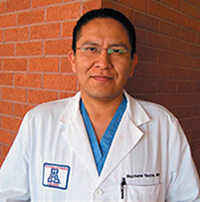 Why did you choose your specific health professional career?
Why did you choose your specific health professional career?
I am pursuing a residency in general surgery. I actually remember wanting to become a surgeon since high school. It is the hands-on approach of this field in medicine in which you use your hands to sew, to repair, to visually see things and to fix them. Growing up in a rural area I got to use my hands to mend fences, pick pinons, shear sheep and help my dad with fixing automobiles. Part of the exposure to anatomy, the blood and guts of it all was being involved in butchering sheep, a Navajo custom. You see all those organs and wonder what each organ does and what it does for a living being. My interest in the biosciences carried through and eventually led to the interest in surgery. Helping people by operating on them is a satisfying experience in that you are visibly changing the course of disease or trauma. This is different from the other fields of medicine such as internal medicine, pediatrics, or emergency medicine. In surgery you can actually see an injury, a vessel that you can fix, a diseased gall bladder or an appendix that you can remove. Lately, I’ve been involved in heart surgeries, where I was opening up the chest and repairing the heart, truly a hands-on experience--that’s why I enjoy it.
What experiences did you have to make sure this profession was right for you?
Volunteering in the hospital setting, getting to know other physicians and surgeons and shadowing them helped me to decide what I wanted to eventually pursue. Scrubbing in on operative cases during my undergraduate years also reaffirmed my decision.
Describe any obstacles or barriers to success that you encountered along your health professional career path and how did you overcome them?
I think the biggest obstacle was the whole application process and getting into medical school. Throughout those times I had to stay determined and not lose the belief in the dream of becoming a physician; perseverance was the ally.
What do you do in your current job?
In a surgical residency you spend five years in surgical training where you rotate in different areas of surgery. Currently I am at the Tucson Medical Center (TMC) in the community on a general surgery rotation. In a general surgery rotation, I’ve been involved with laparoscopic gallbladder removal, some thoracic cases such as lobectomies, and exploratory laparotomies for perforated diverticulitis.
What advice do you have for American Indian/Alaska Native students who are interested in health careers?
I recommend that you continue your education whether or not you decide to go into medical school. It does not matter what field you’re involved in right now. You don’t have to major in molecular biology to go into medicine. You could be in business, sociology, or computer science and still pursue medicine. Look for opportunities to complement your resume, like research. Take those available summers between semesters and do research either close to home, within the country or even abroad. There are many programs for Native American students to get involved where you will meet people, professors, and physicians who can help you on your health career pathway.

